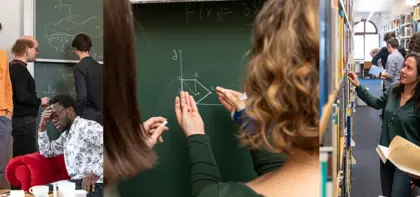
Scientific Members working in this area
/
Current PhD Students
Alumni
The graduates are organized alphabetically by last name. To make navigation easier for you, you can either select the initial letter directly or use the year selection to display all entries from a specific year. Additionally, you will find the title, advisor, and graduation year here. If you would like more information about a particular work, simply click on the title of the thesis.
A
Adams, Zachary
Assimos Martins, Renan
B
Bauer, David
Benner, Philipp
Berkemer, Sarah
Bernigau, Holger
Buss, Guy
C
Campbell-Borges, Yuri Cassio
Clarke, Brian
D
di Dio, Philipp J.
Dubray, David
E
Ehsani, Masud
Eidi, Marzieh
Eikemeier, Christoph
Eisenmann, Henrik
F
Fevola, Claudia
G
Gebhardt, René
Görlach, Paul
Große, Nadine
Gu, Jiao
Gupta, Vishal
H
Handschuh, Stefan
Hecht, Michael
Hofrichter, Julian
Horak, Danijela
Horstmeyer, Leonhard
I
Izadi Khaleghabadi, Mohammad
J
Jiang, Shuhan
K
Kaihnsa, Nidhi
Kell, Martin
Keßler, Enno
Kosiuk, Ilona
Kühn, Stefan
L
Lebedev, Alexei
Liu, Shiping
Long, Yangjing
M
Maiti, Arun
Marigliano, Orlando
Meroni, Chiara
Mintas, Fatmagül
Młynarski, Wiktor
Montúfar, Guido
Mulas, Raffaella
Müller, Johannes
N
Nitsche, Max Joachim
O
Otto, Wolfgang
P
Pederzani, Niccolò
Perrone, Paolo
Poppe, Stephan
R
Rauh, Johannes
Rezagholi, Sharwin
Rodríguez Fernández, Angel Eduardo
Roncoroni, Lavinia
S
Sachse, Christoph
Sağlam, Murat
Sarmiento Cortés, Camilo Eduardo
Savchuk, Yurii
Sayyary Namin, Mahsa
Schneider, Matti
Seynnaeve, Tim
Sosa Garciamarín, Gerardo
Stegemeyer, Maximilian
Sun, Linlin
T
Teich, Marie
Tran, Tat Dat
Tseran, Hanna
V
Vasquez, José Javier
Vodička, Martin
W
Wang, Ying
Wegner, Anatol
Wu, Ruijun
Y
Yamakou, Marius Emar
Yaptieu Djeungue, Odette Sylvia
Z